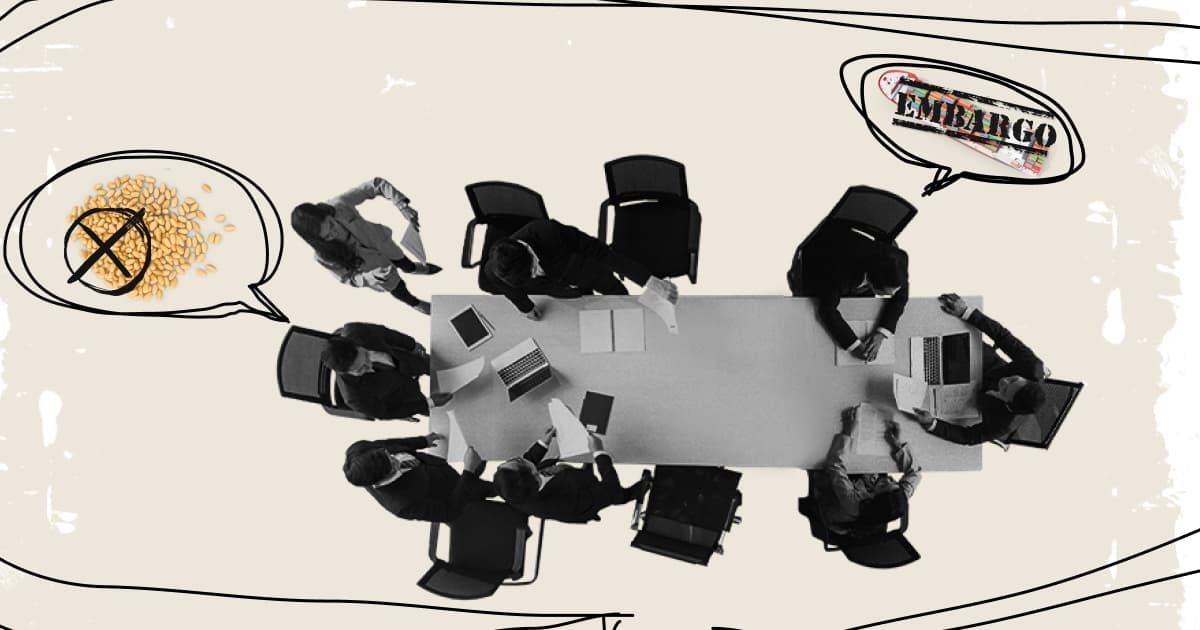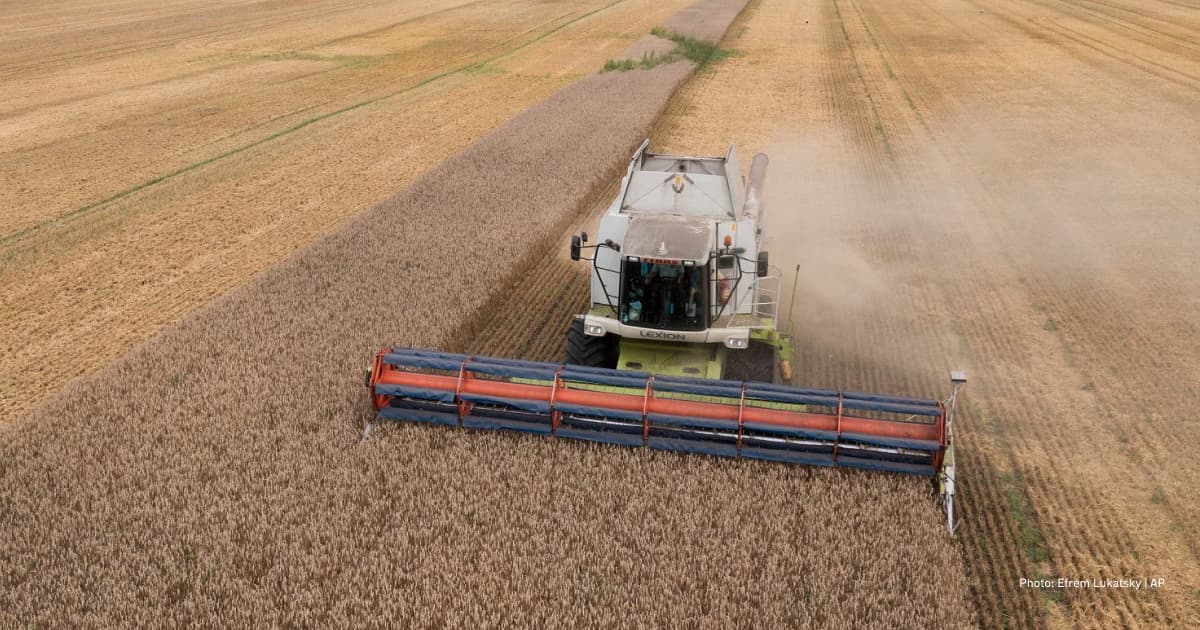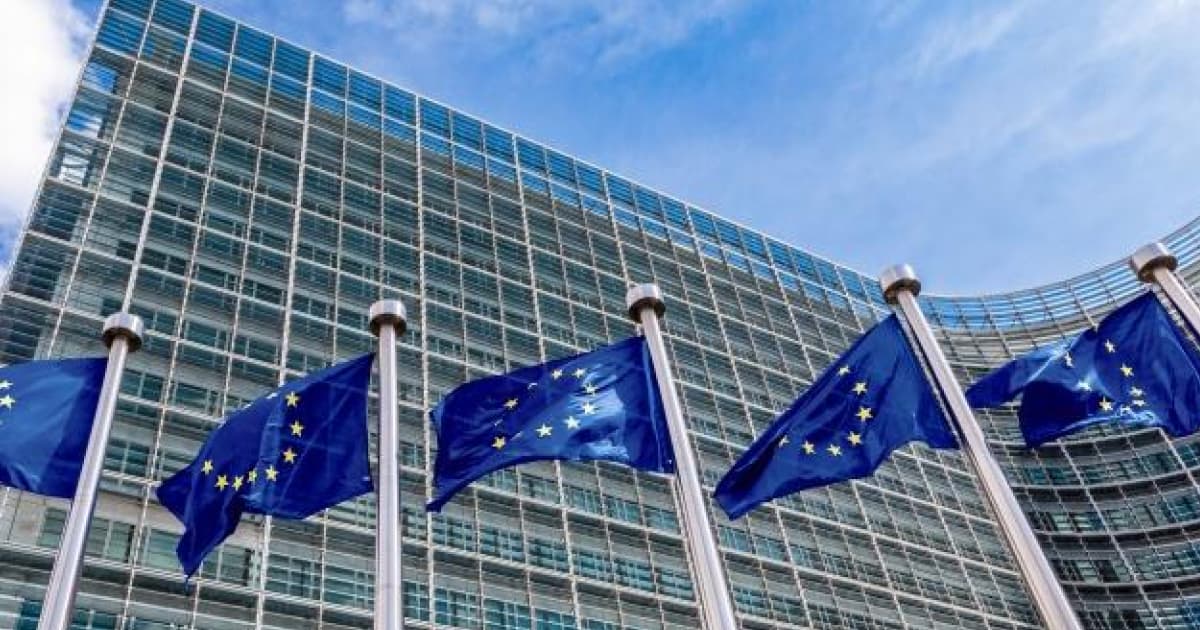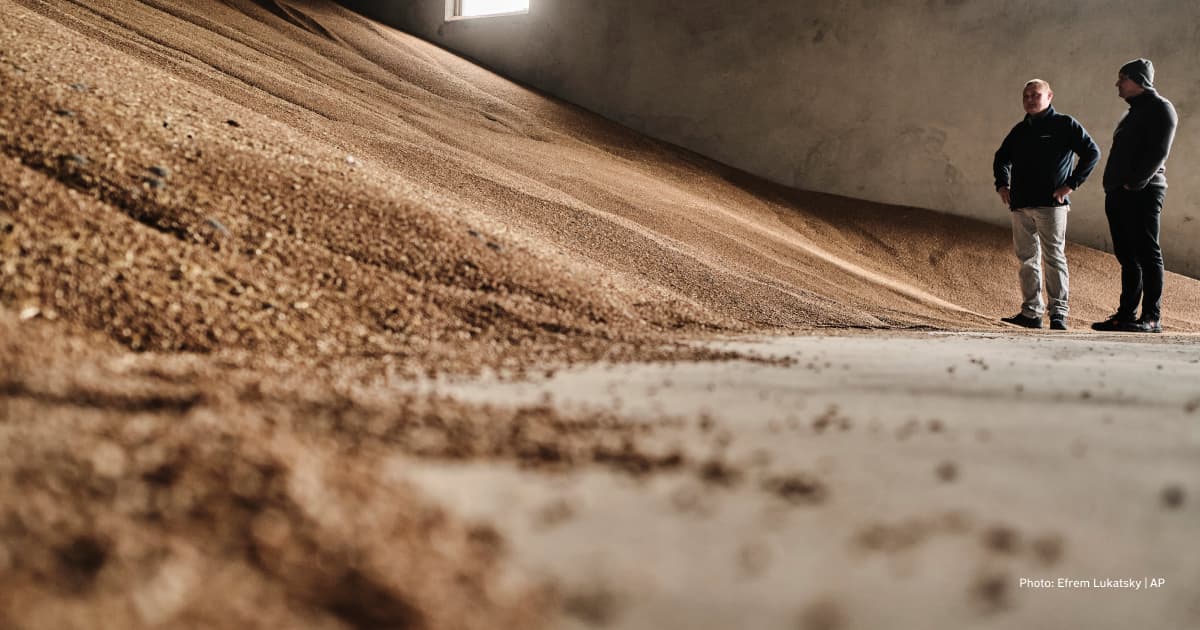Grain embargo: a temporary misunderstanding with allies or an indicator of a broader issue

In 2022, the European Union launched the Solidarity Lanes initiative to establish alternative logistics routes for the export and transit of Ukrainian grain due to Russia's full-scale invasion and blockade of Ukrainian ports on the Black Sea.
In May this year, the European Commission imposed an embargo on Ukrainian grain at the request of five EU member states: Poland, Slovakia, Hungary, Romania and Bulgaria. They claimed that Ukrainian grain affected the grain market in these countries. The European Commission lifted the ban in September.
In this article, we discuss the reasons for the embargo and the potential consequences for Ukraine's future membership in the EU.
The root cause of the embargo
Russia's full-scale war against Ukraine caused fluctuations on the grain market. The rise in prices and the decrease in commodity supply led to panic on the global agricultural market. Ukraine's economy is threatened, as agricultural production accounts for a large share of budget revenues.
The blockade of ports in the Black Sea also became a challenge for Ukraine, as 70% of exports went through them. Traders and the government had to look for other ways to sell. As a result, Ukrainian grain went through the river ports on the Danube and by rail across the western border. Ukraine began transporting an average of three million tonnes of grain a month through Reni and Izmail ports and up to 1.5 million tonnes by rail.
The share of Ukrainian grain in the EU markets has increased. Romania increased its wheat imports from 0.5% to 15.8%. Spain increased purchases of Ukrainian wheat to 14% of its total grain purchases. Poland ranked fifth among wheat importers. In 2021, it was not among the top ten.
Ukrainian grain went through five countries: Poland, Hungary, Slovakia, Romania, and Bulgaria. It was to be delivered to the Baltic and Mediterranean seaports, and from there to customers in Africa and Asia. The European Commission even called the initiative Solidarity Lanes. Low throughput, border queues, and railway gauge differences delayed agricultural exports. In 2022, this scheme looked like it was working, albeit not perfectly. But in early 2023, farmers' protests erupted in five transit countries.
Farmers complained about the "dominance of Ukrainian grain", the "artificial overloading" of granaries and port congestion. Polish farmers also threatened to disrupt the visit of the President of Ukraine to Poland in April. However, there were also justified reasons for the protests. In 2023, the price of wheat on Polish stock exchanges fell below PLN 1,000 per tonne, which is half the price in 2022, when it reached PLN 2,000. For comparison, in 2021, it was PLN 900 per tonne.
Warsaw was the first to react. Protests by local farmers against lower grain prices and the replacement of Polish grain with Ukrainian grain prompted the Polish government to impose an embargo on all imports of agricultural products from Ukraine. The order was introduced in April, and Polish Minister of Agriculture Henryk Kowalczyk resigned at the protesters' request.
Hungary, Slovakia, and Bulgaria quickly joined Poland's decision. Romania supported the request to the European Commission to impose a temporary embargo. This strengthened the Polish government's position in negotiations with the EU.
On May 2, the European Commission imposed a temporary ban on agricultural products in five of Ukraine's neighbouring countries. This was preceded by weeks of negotiations between the EU and national governments. As a result, the embargo was softer than the EU countries had expected, and Ukraine could no longer rely on the Western route to export agricultural products to the EU. In the summer, Danube ports underwent active modernisation, and their share in grain exports is likely to increase to 44% of the total.
Kyrylo Zlochevskyi, Chief Executive Director of the logistics company Bioenergy-Vinnytsia, explains that traders choose Danube ports because of the high prices for logistics on the western border. The minimum rate for transportation is $100 per tonne of grain.
"There is no alternative to the Danube," says Dmytro Moskalenko, CEO of Ukrainian Danube Shipping Company. "The checkpoints and railway infrastructure are as much in danger as the Danube ports. We need to strengthen air defence and keep working," he said.
From Solidarity to protecting national interests
Poland imposed the embargo rather quickly and even violated the Treaty on the Functioning of the European Union. According to this treaty, only EU institutions, not individual member states, have the right to decide on the free flow of goods through the Union. The Polish government immediately faced criticism from the European Commission for violating the treaty and spreading doubts about the work of the EU institutions. Yet, it was ready for an open confrontation with the EU.

This decision can be explained by the elections to be held in Poland in autumn, and Polish farmers are a large part of the electorate of the ruling Law and Justice party. 45% of all farmers expressed willingness to vote for the ruling party in May 2023. Therefore, Law and Justice is ready to confront the EU to prove to its voters that they are primarily protecting the interests of Poles. Regarding imports of agricultural products from Ukraine, the government was even more likely to rectify the consequences of its promises than to make decisions contrary to the EU. In 2022, Law and Justice politicians promised only a grain corridor for grain from Ukraine and that this would not affect the market in Poland. In 2023, the price fell by half.
Agricultural market analyst Myroslav Martsyniak believes that global markets dictate prices on the Polish market, not imports from Ukraine.
"Since May, the Polish border has been closed to wheat, corn and rapeseed imports. Current wheat prices in domestic ports are comparable to wheat quotations on the international MATIF exchange. Poland has a surplus of grain for which it is difficult to find export markets," he says.
The protests of the main part of the electorate on the eve of the elections put the Polish government in a position where it had to act quickly. Farmers united in The Deceived Village movement and rallied across the country.
Law and Justice's main opponent from the right wing of Polish politics, the radical Confederation Liberty and Independence party, also used the protests for its election campaign. The activity in the protests raised the Confederation to third place in the pre-election rankings.
"The electorate of such a radical party as Confederation is strongly affected by this situation. They have been confirmed in their hypothesis that everyone is an enemy," explains Oleh Biletskyi, editor of Ukrayina.pl and a journalist for TVN24.
Still, Biletskyi believes that the embargo issue will not significantly impact the majority of Polish voters, as geopolitical challenges remain relevant for both countries.
Another opposition party in Poland, the Civic Coalition, has been actively criticising Law and Justice for the embargo and "anti-European rhetoric" but has not offered any alternative solutions.
"Minister Kowalczyk misled farmers and caused many losses. Law and Justice, in my opinion, did this deliberately to foster anti-Ukrainian, anti-European sentiment before the elections, to foster nationalism in Poland," said Michał Kołodziejczak, one of the leaders of the Civic Coalition, commenting on the whole situation around imports.
The Polish government understood that the embargo violated EU acts and treaties, and that Ukraine could file a complaint with the European Commission, so they were looking for ways to have the decision legalised by EU institutions.
The coalition of victims of Ukrainian grain
The Hungarian government joined the Poles in imposing its ban on imports of Ukrainian agricultural products in April 2023. Budapest accused the EU of "inaction" and explained the embargo as "protecting the interests of Hungarian farmers". Slovakia, also preparing for parliamentary elections in September, has banned imports. The reason was "to protect the national interests and farmers of the country". Bulgaria explained its decision by "concern about the oversupply of grain crops on the market". Romania did not impose a ban at the national level but joined Poland in asking the European Commission for an import embargo.

Each government's response to the situation reflected the domestic political situation in each country. Poland and Slovakia were preparing for elections and quickly imposed the ban. The Romanian government has time until the 2025 elections, so it limited itself to appealing to the European Commission. For Hungary, a consolidated position with Poland was more an attempt to show its support for its EU ally than a solution to internal problems. In recent years, the EU has been actively criticising Hungary for its inaction in the fight against corruption and violations of the rule of law, so the governments of these countries have pursued a united policy of confronting the EU.
Regardless of the reason for the embargo, the EU member states were ready to violate the agreement with the EU for their interests. Poland explained its actions by saying the EU was "too slow to respond to the country's requests regarding the embargo". The European Commission, for its part, proposed to set up an expert group to study fluctuations in the markets of individual countries. Once the requirements for agribusiness subsidies were met, Poland and other countries agreed to the agreement with the EU.
In April, the Ukrainian government initially held talks and discussions with each country individually, but this yielded little results. Ukraine appealed to the European Union to impose import restrictions, arguing that the embargo contradicts the Association Agreement.
The EU's decision is an example of pragmatism
After lengthy negotiations with member states, on May 2, the European Commission temporarily banned imports of four agricultural products - wheat, corn, rapeseed and sunflower seeds. The measure aims to " eliminate logistical problems" related to these products in Bulgaria, Hungary, Poland, Romania and Slovakia. The Commission also began assessing the situation on the grain markets of the five EU member states and allocated subsidies to farmers to cover their losses.

The ban lasted all summer and was lifted on September 15. The European Commission analysed data on the impact of agricultural imports on the EU market. It concluded that prices for farm products in the five member states bordering Ukraine had stabilised. Also, in early September, a dispute between the governments of Ukraine and Poland over the extension of the ban flared up again. Ukraine has promised to file a complaint with the World Trade Organisation if Poland decides to extend the embargo. The WTO dispute procedure can take up to 15 months, and the consultation stage can take up to 60 days. The Polish Foreign Ministry accused Ukraine of pressure that "goes beyond all bounds".
The EC's initial decision to impose the embargo indicates that the member states, led by Poland, managed to put pressure on the EU and achieve a partial ban on agricultural imports. The subsequent ruling on the suspension meant that the EU did not see a critical problem with grain imports on the EU market. The EC's decision also divided the five countries united in achieving the import ban. Bulgaria lifted the ban even before the European Commission. Romania abstained. Poland, Slovakia and Hungary announced that they would reintroduce import bans at the national level, violating the agreement with the EU to lift these measures.
On September 18, Ukraine filed a lawsuit against Poland, Slovakia, and Hungary at the World Trade Organisation. Poland responded by saying that it did not understand the legal basis for the claim and reiterated its claim to protect the interests of Polish farmers.

"Ukraine will compete with Polish grain primarily in exports to Western Europe, our largest counterparty. The same goes for poultry. Processors from Germany and the Netherlands are already buying products directly from Ukraine. This problem will remain with us for years," comments analyst Myroslav Martsyniak on the embargo situation.
Ukraine also submitted an action plan for grain exports to the European Commission. According to it, Ukraine provided information on exports of specific agricultural products and the country of destination for exports. It also introduced a system of export data verification. Bulgaria and Romania agreed to review and implement it. Hungary, Slovakia, and Poland initially withdrew from the negotiations but then returned in a face-to-face format without the mediation of the European Commission. The Ministry of Agrarian Policy reported that Slovakia had agreed to the action plan. Poland and Ukraine, as of the end of September, were still in the process of reaching an agreement. The Polish authorities are also actively communicating the story in the media. Polish journalists believe this is pre-election rhetoric and will end after the elections. Ukraine is worried this will affect relations between the countries in general.
Journalist Oleh Biletskyi believes the ban will impact future relations between Ukraine and Poland. This is the first time the two countries have polarised the situation since Russia's full-scale invasion of Ukraine.
"Any country that became a member of the European Union automatically became a competitor for other countries, which is essentially the norm. Both sides have to draw positive conclusions from this situation, and we will learn to look at this situation from a pragmatic point of view. Our geopolitical interests are identical, but at the same time, there are issues in which we are competitors. And it is okay to be competitors; the point is to be able to negotiate," Biletsky comments on the possibility that the embargo situation will affect the future relations between the two countries.
The behaviour of the governments of three of the five countries shows that this situation with Ukrainian grain imports will have long-lasting consequences for Ukraine's relations with its neighbours, especially Poland. Ukraine is one of the top 5 grain exporters in the world. The Polish government understands that the Polish agricultural industry cannot compete with the Ukrainian one. Polish Minister of Agriculture Robert Telus said that the country would use the blockade on Ukraine's membership in the EU to obtain preferences from the EU for its agricultural sector. The only question is whether Poland will pursue such a policy alone or in alliance with other countries.


